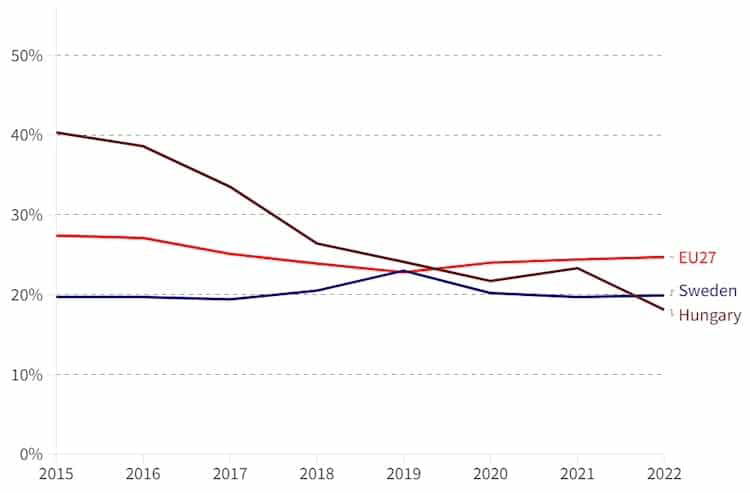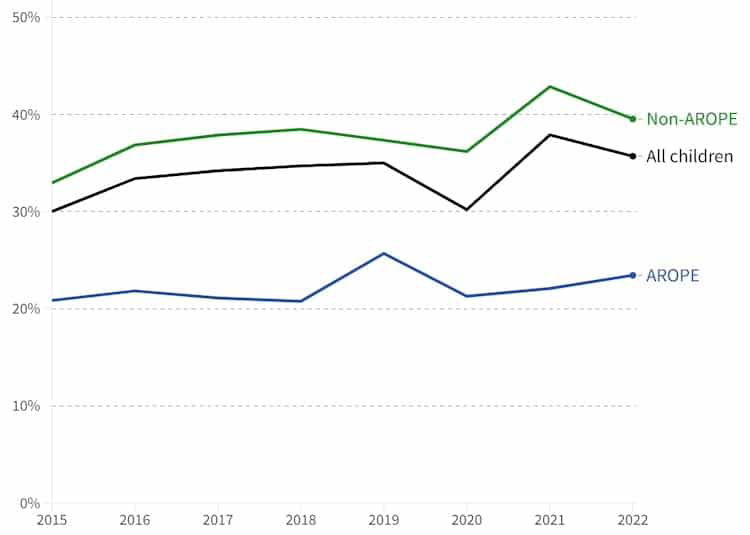The recent rise in child poverty and exclusion in the European Union risks reversing progress made before the pandemic. To address this worrying trend, EU policies are increasingly directed towards making access to services integral to tackling child poverty. Improving data collection, targeting inequalities and involving the workforce that delivers services in policy-making are important in closing the gaps.
This effort is underpinned by the wider drive to build a more just and inclusive Europe. For example, the Just Transition Mechanism in environmental and climate action aims to ensure no one loses out in the transition to a ‘net zero’ Europe by 2050. The pursuit of justice also drives the national minimum targets for reduction of child poverty and social exclusion, to be achieved by 2030.
Rising risk of poverty
So how is Europe faring in meeting these goals? At first glance, it would seem relatively well. The proportion of children at risk of poverty or social exclusion (AROPE) was lower in 2022 than in 2015 (Figure 1). This was largely a catch-up process, with countries lagging in 2015 (such as Hungary) reducing AROPE rates for children more quickly than those with lower initial rates (such as Sweden) and disparities in performance decreasing over time.
But on closer scrutiny the average EU27 AROPE rate has risen since 2019. This largely reflects the high cost to many children of the pandemic and the war in Ukraine.
Figure 1: children at risk of poverty or social exclusion (%)

With inflation sustaining the cost-of-living crisis, this negative trend will continue unless active, concrete steps are taken to offset child poverty across the EU. Key services must be fully mobilised to support the children and families most in need.
Access to some of these services—such as education and healthcare—is the main objective of the European Child Guarantee. Even when services are universal, however, some groups of children seem to be failed time and again, because the quantity or quality of provision is inadequate.
Gap in participation
Access to early-childhood education and care (ECEC) in particular has been the subject of much attention at EU level. In her 2023 State of the Union speech, the European Commission president, Ursula von der Leyen, said lack of access to ECEC caused millions of parents to struggle to reconcile work and family life.
ECEC participation among children under three is one of the indicators monitored by the European Semester in tracking member states’ progress in the social domain. A participation rate of at least 45 per cent is one of the (revised) Barcelona targets, established to enhance childcare in the EU.
Aggregate achievements do not however tell the full story. What about children at risk of poverty or social exclusion specifically? Official data on this are not readily available but a Eurofound policy brief provides, for the first time, findings on differential ECEC participation and how this has changed over time (Figure 2).
The overall participation of EU27 children under three in ECEC for at least one hour a week increased between 2015 and 2022. The rise in participation was lower, however, in the case of children at risk of poverty or social exclusion (up from 21 to 23 per cent) than for other children (up from 33 to 40 per cent). The gap in participation between these two groups thus widened—a very concerning development.
Figure 2: participation of children under three in ECEC, by AROPE status, EU27, 2015-22 (%)

Closing the gap
While it is not possible to drill down to member-state level because of inadequate data, such EU-wide trends indicate the need to put in place measures to close this gap. Additional resources should support the inclusion of children in vulnerable situations. In earlier research Eurofound documented evidence-based initiatives with this goal—most centre on adequate training of the workforce delivering services to disadvantaged children and families.
Such measures could be financed through the European Social Fund Plus, one of the main sources for the European Child Guarantee. Deeper involvement of the social partners in the guarantee would help identify the most suitable measures to ensure EU targets are met efficiently and fairly, since trade unions and employers know the needs of staff.
So are we doing enough to lift the most disadvantaged from poverty and avoid further stigmatisation and exclusion? Notwithstanding the many initiatives at EU and national levels, the data point to serious concerns. Immediate and continuing action must be prioritised if we are to ensure the youngest and most vulnerable members of society receive the support and protection they deserve—and we do more than pay lip service to ‘leaving no one behind’.
Daniel Molinuevo is research manager in Eurofound’s social-policies unit.

